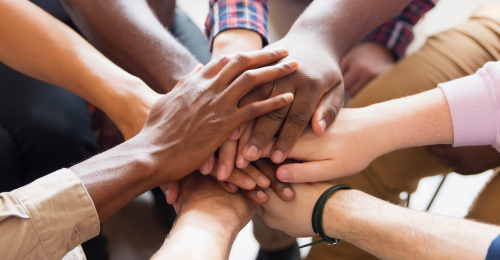BYU, Duke, Pitchforks and Torches
It is entirely possible that both BYU and Duke are right in this matter. Consequently, we should give both BYU and Duke the benefit of the doubt.

— Official Statement, Church of Jesus Christ of Latter-day Saints, Aug 2017
The News
On September 9, 2022, Brigham Young University announced that it had lifted the ban it placed on a fan accused of using a racial slur during its August 26, 2022 volleyball match against Duke, and BYU apologized to the fan.
In its investigation, BYU interviewed more than 50 individuals who attended the match including people from BYU and Duke.
BYU also reviewed "all available video and audio recordings" of the event, including raw security footage, and raw broadcast footage from BYUtv. It even processed audio so that noise from the stands could be heard more clearly.
The university said it found no evidence to corroborate allegations of racial heckling against members of the Duke women's volleyball team.
— Russell M. Nelson, President of the Church of Jesus Christ of Latter-day Saints
The Reaction
There are two groups of people who are angry about these findings.
- Those who claim BYU's investigation was a sham and a coverup, and that BYU is now inferring that Duke players were lying.
- Those who are calling for "some kind of action" to be taken against the Duke player(s) who made the allegations.
To put it bluntly: both of these groups are wrong, and they need to lay down their social media pitch forks and torches and lock into this important fact:
It is entirely possible that both BYU and Duke are right in this matter.
Consequently, we should give both BYU and Duke the benefit of the doubt.
Quick Disclosure
Before I go further, because this topic touches on racism, I should probably disclose that I am Native American.
I am a member of the Tlingit tribe of Southeast Alaska. I am of the Raven moiety, and of the T'akdeintaan (Seagull) clan. My Tlingit name is Koohook. My mother raised me in the ways of our people: I harvested herring eggs, fished, hunted, ate Tlingit foods, wore regalia, danced, sang, etc. In my youth I went with mom to meetings of the Alaska Native Brotherhood Camp 1 in Sitka, Alaska where I learned more about my culture, and became more involved in Native matters. I even helped mom with her Bingo cards. 🙂
From time to time someone will say to me something like, "I've been told that my great-great-great-grandma was a Cherokee princess." I love it when people tell me things like this because to me it means that they are proud of their connection to an indigenous culture, and thus it seems unlikely to me that they would think less of me for my connection to mine.
At any rate, in my experience, bigotry can be overt, like yelling racial slurs at a sporting event, but prejudice can also be crafty, like outwardly treating people respectfully, but also not really considering them peers.

Whether overt or crafty, I hope we can all agree that both forms of prejudice are wrong.
— President Dallin H. Oaks, First Counselor in the First Presidency,
Hostile Environments
Sports venues can be intense and hostile. Consequently visiting athletes can be intimidated and even fearful when surrounded by people who are not like them, and who do not like them.
The most hostile sports environment I personally ever played in was city league basketball in Juneau, Alaska. The state prison had two teams in the league.
When it was our turn to play a prison team, we had to go through extensive security as we entered the prison. It is intimidating to go through metal detectors then get patted down. And we were not allowed to bring a gym bag in; we could only bring a basketball in our hands (which guards inspected) and what we were wearing.
When we passed security, we were not allowed to go into the gym. Instead we were herded into a small cage outdoors, outside the gym.
Picture this: it is winter in Alaska. Eight guys wearing only basketball jerseys, shorts, socks, and sneakers are literally huddling together in a cage outdoors, trying to use our teammates' body heat to keep us warm. As we shivered for what seemed like 20 or so minutes, we can hear on the other side of the door our opponents bouncing balls, taking shots, and warming up.
When we are finally let in, the stands are packed full of inmates, and they are yelling every imaginable thing at you — no rules. And the crowd treats you like that all game long — and they jump on you mercilessly over ever mistake.
My favorite memory of those games was a league championship game we played against a prison team one of those seasons. The prison team led most of the game, but we took the lead in the fourth quarter.
As the point guard, I had the ball in my hands at the beginning of our possessions. In the closing minutes of the game, our opponents started to intentionally foul me — hoping I would miss 1-and-1 free throws so they could get the ball back and take the lead.

As a result, in the final minute or so of that championship game in that unbelievably hostile environment, I had to stand alone at a free throw line six different times and try my best not to let my team down.
And each time the most vulgar — and creative — insults I have ever heard were screamed at me. (Thankfully I made all six free throws and we won).
If you have not played team sports in front of a loud, hostile crowd, then you really have no idea what these young Duke players were feeling that day in the Smith Field House.
Racial slurs or not, it is very possible those young women felt hated.
So let's give them the benefit of the doubt about that.
Ear-Witnesses
I could write about how easy and common it is for all of us to mishear things, but I think this video would do a far better job of it than I could. It is 6m 24s, and it has some bad language. But even if you watch for just a few seconds, you fully realize that it is really easy to mishear stuff, and yet be 100% certain you have it right.
Given the hostile environment of many sports venues, and our very human ability to mishear things, it really is awfully dumb of people to not give both Duke and BYU the benefit of the doubt in this matter.
Given the hostile environment of many sports venues, and our very human ability to mishear things, it really is awfully dumb of people to not give both Duke and BYU the benefit of the doubt in this matter.
— Gordon B. Hinckley
Creating victims
Ever since this incident, people have been creating additional victims in the aftermath.
- The Accused - Since day one police have said that the young man who Duke accused of yelling racial slurs as Rachel Richardson served has special needs and is socially akward.
Even so, if he yelled racial slurs at a sporting event, then he truly does need to be removed from the match — disability or no disability.
But video evidence proves that when Richardson was serving, the accused was either on his phone not paying attention to the game, or not even in the room. He didn't do it.
The last thing this poor guy needs is additional hardships in his life.
Nevertheless, in BYU's zeal to remove an accused racist, BYU ejected and banned an innocent person.
BYU created another victim.
And frankly, people who have been conveniently leaving out the fact that the accused has special needs so they can use him as a pawn to push a narrative of a racist church are creating victims too. - Church members at the match - People who were not at the match have questioned the character of those who were there.
"Why didn't the people there speak up?" they ask. 'Why didn't they stop it?"
Few are innocently befuddled by these questions.
Most have used these questions to infer — or to openly claim — that the reason no one spoke up to stop racial slurs is because a stealth racism skulks through the Church of Jesus Christ of Latter-day Saints.
Their accusations are crafty prejudice.
Remember: an extensive review of all audio and video of the match did not hear racial taunts either. And neither did the police officer assigned to stand by the Duke bench.
Inferring that a whole crowd of people are closet racists because they did not react to slurs that they honestly might not have heard is pre-judging.
Ethical people should be uncomfortable chastising a group of strangers for assumptions they choose to make about them.
By all means, let's be united against racism.
But let's not resort to religious bigotry to do it.
— Dr. Martin Luther King (Strength to Love, 1963).
I don't know what happened at the Duke-BYU volleyball match on August 26, 2022.
And neither do you.
Moreover, I cannot imagine the hubris it takes to seriously believe that you know what happened at that match better than the people who were actually there, and better than the people who studied hours of audio and video.
But I do know that people with agendas have been creating victims. And that needs to stop.
Racism and the Utah Jazz
The first time any NBA team ever banned a fan for life was when Shane Keisel was banned by the Utah Jazz on March 12, 2019 for yelling racial taunts at Russell Westbrook at a Jazz game. Some of the incident was caught on video, but it was witnesses who spoke up and filled in the blanks that sealed his fate.
Question: do you really think that was the first time a fan ever used racial slurs at an NBA game?
Me neither.
In the NBA's 72 years, out of the 30 teams in the NBA, it was UTAH that was the first to say: "Racism is not okay here. Use racial slurs in Utah, and you will be banned for life, get your name in the press, and pretty much ruin your career."
(Shane Keisel was fired from his job with Brent Brown Toyota, and terminated from the pilot training program with SkyWest Airlines).
Only two days after the incident, Jazz owner Gail Miller, an active member of the Church of Jesus Christ of Latter-day Saints, delivered a pre-game speech. She made it clear to the world that Utah has a "zero tolorence" policy when it comes to racism. To my knowledge, no other sports franchise owner had ever made such a speech before her.
The Jazz even setup a phone number for fans to text if they hear someone use racial slurs at a game.
And in case you thought that was just a publicity stunt, when cell phone video emerged of a Jazz fan calling Russell Westbrook "boy" a year earlier, the Jazz investigated it, identified the fan, then banned him for life too.
Then on May 27, 2021, the Jazz banned THREE fans for comments directed at the family of NBA player Ja Morant. By the way, that altercation was not caught on camera; Utahns came to the defense of the guests.
my family told me they felt the love from all the other jazz fans who were around them 🤝 even bought each other drinks with a few.
— Ja Morant (@JaMorant) May 28, 2021
those 3 just went too far 💯 https://t.co/1XvjXcPVOo
The Utah Jazz, under the ownership and leadership of Latter-day Saints, has been the most proactive NBA franchise at coming down hard on racial taunts. In fact, other sports franchises are following Utah's lead and giving fans lifetime bans too.
The vast majority of church members are not the caricature being drawn by people eager to portray the Church as secretly racist. In fact, if a member of the Church of Jesus Christ of Latter-day Saints is racist, it is because he or she is defying the teachings of the Church — not because they are following them.
If a member of the Church of Jesus Christ of Latter-day Saints is racist, it is because he or she is defying the teachings of the Church — not because they are following them.
— ChurchOfJesusChrist.org
Listen up, @BYU:
— Tom Pittman (@TomPittman7) September 12, 2022
Put banners in all sports venues that say, "To report racist or inappropriate comments, please text xxx-xxx-xxxx."
Just the presence of such banners where fans can see them would deter people.@BYUSportsNation @BYUCougars @BYUwvolleyball
Racism and the Church
When The Church of Jesus Christ of Latter-day Saints was founded by Joseph Smith in 1830, decades before the American Civil War, it had no doctrines or practices that discriminated against anyone because of their race. People of African American descent were treated like every other person in the church.
For example, official church records show that in 1836, church founder Joseph Smith declared that a Black man named Elijah Abel (or Able) was "entitled to the priesthood and all the blessings."
In the 1830s, the Church's anti-slavery position is one of the reasons church members experienced terrible mob violence in Missouri, and were eventually driven out of the state.
Throughout his life, Joseph Smith published several anti-slavery articles in newspapers, and in 1844, made the abolition of slavery part of his platform when he ran for president.
After the death of Joseph Smith, Brigham Young led the church west and settled in what is now known as Utah. At that time there were Black members of the church in Utah who were free, and some who were slaves.
Prior to the Emancipation Proclamation in 1863, abolishing slavery was a tricky thing for a state or territory to attempt as the American Civil War neared. Because slaves were considered property, the legalities of freeing slaves without compensating slave owners meant court challenges that would likely be lost.
In a move designed to abolish slavery in Utah, the Utah Territorial Legislature legalized slavery in 1852 — but with important conditions.
For instance, if slaves were brought to Utah, their decendants would be born free. And no person could remove a slave from Utah without the slave's consent. Slaves were entited to humane treatment, and were required to have access to education.
These laws guaranteed that slavery in Utah would end in a generation, and without the territory having to compensate slave owners.
After the Utah Territorial Legislature passed these laws, Brigham Young, who as Utah's governor made public statements in favor of the laws, made the surprising announcement as president of the Church that "men of black African descent could no longer be ordained to the priesthood."
In making this announcement, Brigham Young also said that at some future day, Black Church members would "have [all] the privilege and more" enjoyed by other members.
If you want to call that policy racist, you would not be wrong. Withholding the priesthood based on race is pretty much the definition of a racist policy.
Then again, this policy was born in a racist era — when slaves were property, and in a country with a Constitution which said representation would be calculated with Blacks counting as three-fifths of a person.
In the decades that followed, church scholars and leaders openly speculated as to why the Church had this policy about Blacks and the priesthood, but it was speculation, not church doctrine.
Then in June 1978, church president Spencer W. Kimball revoked the policy.
Apparently some members were upset with the policy change in 1978, but the vast majority of church members were overjoyed. Many hated the policy and were embarrassed by it, and they struggled to reconcile the policy with the teachings of Christ.
In short: from 1830 to 1852, all races were treated the same in the Church. Then from 1852 to 1978, the priesthood was denied to Black people — and we've never really known why. But after 1978, the Church has been consistently trying to root out racism from its ranks.
— Race and the Priesthood, Gospel Topics Esssay
In Conclusion

The great philosopher, Steven Wright, once said, "OK, so what's the speed of dark?"
That's a good question, isn't it? What is the speed of "dark"?
The speed of dark might be how quickly a person chooses to think the worst of someone else.
— President Russell M. Nelson
For those keeping score at home, the people who have used the BYU-Duke women's volleyball incident to push a narrative of a racist church:
- Have been using a young man with special needs as their evidence,
- Disregarded the fact that BYU acted so aggressively against racism that it mortified and punished an innocent person,
- Have turned a blind eye to the fact that Latter-day Saints have made Utah a national leader in ending racial heckling at sporting events,
- Are choosing to ignore that the Church has been working on rooting out racism, and at healing wounds with the Black community.
Sadly, almost none of those who took to social media to condemn the Church and BYU over the racism allegation will also circulate the findings of an actual investigation into the matter — except to mock the investigation.
But that tells us more about their character than it does the Church's, doesn't it?
It is entirely possible that both BYU and Duke are right in this matter. Consequently, we should give both BYU and Duke the benefit of the doubt.
I hope you will take a moment to watch the video below by CNN before leaving.
Thanks for listening.
— M. Russell Ballard, Acting President of the Quorum of the Twelve Apostles
BYU reverses ban on fan after finding no evidence of slur against a Duke volleyball player. @JohnAvlon has today’s Upon Further Review: pic.twitter.com/YjfhOwtHTq
— New Day (@NewDay) September 12, 2022






















